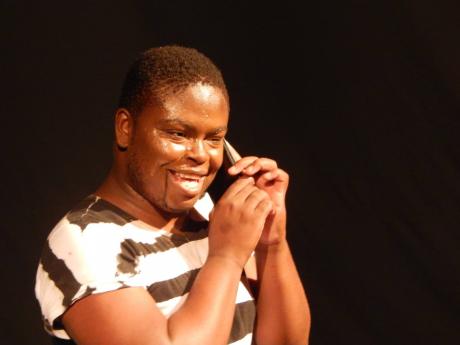Fine acting marks School of Drama final show
Last Sunday, the seven one-person productions of approximately 40 minutes each by the 2019 final-year students of the Edna Manley College’s School of Drama came to an end.
The productions were marked by fine acting – with each of the performers playing numerous characters who, generally speaking, were well differentiated in terms of voice, body language, and characterisation.
The weakness was to be found in the stories the actors were telling. They tended to be unstructured.
The topics were chosen by the students according to their interest or curiosity. The student- creators and their shows were Pascal Major ( Chanzy), Waldane Walker ( Mask Q Lie?), Marchinel Smith ( Dirty Laundrey); Alandrea Reynolds ( SinTing), Aaron Moodie ( Man Up), Jaycie Lewis ( The Ebony Experience), and Shemar Ricketts ( Mirror Mirror).
Major’s play focused on the effects that traumatic events in a child’s life can have on them later on in life. The story is about a young Caribbean man, but Major wants Caribbean audiences to realise that trauma is common to young people around the world. Walker focused on the masks that some men are forced to wear. The protagonist, Nicholas, has a truth he wants to share with society, but it is constantly snatched away, and he is handed a mask to show he is masculine or, at least, man enough. Smith’s production focused on the consequences of a mother’s decision to migrate to America to help her children financially. The consequences are bad for her in America, and disastrous for her children back home in Jamaica.
Reynold explored the sexual objectivisation of women. Her research showed her that the phenomenon is so seeped into our culture that it has become normal and we may not recognise when it is happening, or, if we do, may turn a blind eye.
Moodie looked at how society influences masculinity. Specifically, he asks the question, can a real man be a poet? After the death of his mother and falling under the influence of his father and a high-school bully who want him to ‘man up’, he finds himself on the brink of making risky choices.
Lewis’ theme was ‘colourism’, coined and defined by The Colour Purple author, Alice Walker as “prejudicial and preferential treatment of same-race people, based solely on their colour”. Lewis confesses, “As a dark-skinned Antiguan, I have experienced and internalised colourism”. An important research question she asked was, “How can performance be used to theatre these experiences and ... engage Caribbean audiences in a conversation on this social ill?”
Ricketts’ theme was the phychological effects of bullying. He attempted to recreate the mental experience theatrically. He told me that as a child, he had been bullied and the research was traumatic for him so that he had to get counselling. But it was worth it, he said, as it left him a more confident person. He plans to revise the show and perform it in schools to inform and positively influence others.
The productions were part of the independent study assignment that the fourth-year students were given as part of their Bachelor of Fine Arts programme. According to the shows’ producer and that head of the school, Marvin George, the independent study project is “a tremendously demanding, immersive, and deeply rewarding undertaking” for the participants. The course calls on the students’ knowledge and competencies gained over the previous three years of training.
The learning, he elaborates in his printed producer’s note, “include research, devising, dramaturgy, playwrighting, design, directing, and, of course, acting”. If all goes well, these students will graduate in November.

